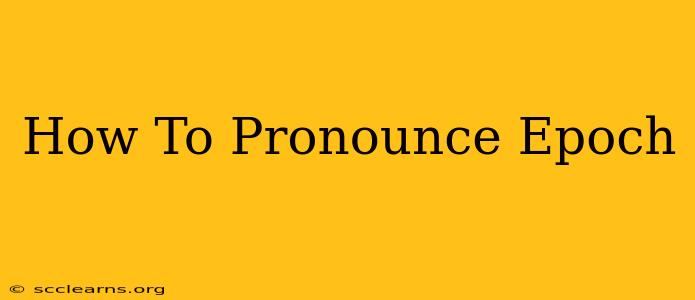The word "epoch" often trips people up, but mastering its pronunciation is easier than you might think. This guide will break down how to pronounce "epoch" correctly, offering tips and tricks to ensure you say it with confidence.
Understanding the Syllables of "Epoch"
"Epoch" is a two-syllable word. This is crucial for correct pronunciation. Knowing this immediately simplifies the process. The syllables are:
- Ep - This is the first syllable, and it's pronounced with a short "e" sound, similar to the "e" in "bed".
- och - This is the second syllable. The "o" sound is similar to the "o" in "hot," and the "ch" makes a "ch" sound, like the "ch" in "cheese."
Phonetic Transcription of "Epoch"
A phonetic transcription can be incredibly helpful. The phonetic spelling of "epoch" is roughly: /ˈɛpɒk/
- /ɛp/ represents the first syllable, with the short "e" sound.
- /ɒk/ represents the second syllable, with the "o" sound as in "hot" followed by the "ch" sound.
The stress is on the first syllable (ˈɛpɒk), which is indicated by the apostrophe and the accent mark. This means you should emphasize the first syllable slightly more than the second.
Common Mispronunciations and How to Avoid Them
Many people mispronounce "epoch" by:
- Overemphasizing the second syllable: Remember, the stress is on the first syllable. Avoid making the second syllable louder than the first.
- Using the wrong vowel sounds: Ensure you use a short "e" in the first syllable and a short "o" in the second, not a long "e" or "o."
- Pronouncing "ch" incorrectly: The "ch" should sound like the "ch" in "cheese," not like the "ch" in "loch" (Scottish pronunciation).
Practice Makes Perfect
The best way to master the pronunciation of "epoch" is through practice. Try saying the word aloud multiple times, paying close attention to the syllables and stress. You can also:
- Listen to audio pronunciations: Many online dictionaries offer audio pronunciations of words. Listening to a native speaker can be very helpful.
- Record yourself: Recording yourself saying the word allows you to identify any areas where you need improvement.
- Use the word in sentences: Practicing the word in context can make it easier to remember and use correctly. For example: "The invention of the printing press marked a new epoch in history."
Expanding Your Vocabulary: Similar Words and Usage
Understanding the word "epoch" can open doors to a richer vocabulary. It's often used interchangeably with words like:
- Era: A period of time marked by notable events or particular characteristics.
- Period: A length or portion of time.
- Age: A period of history distinguished by particular characteristics.
By understanding the subtleties of pronunciation and usage, you can confidently incorporate "epoch" into your conversations and writing, enhancing your communication skills. Remember, practice is key!

